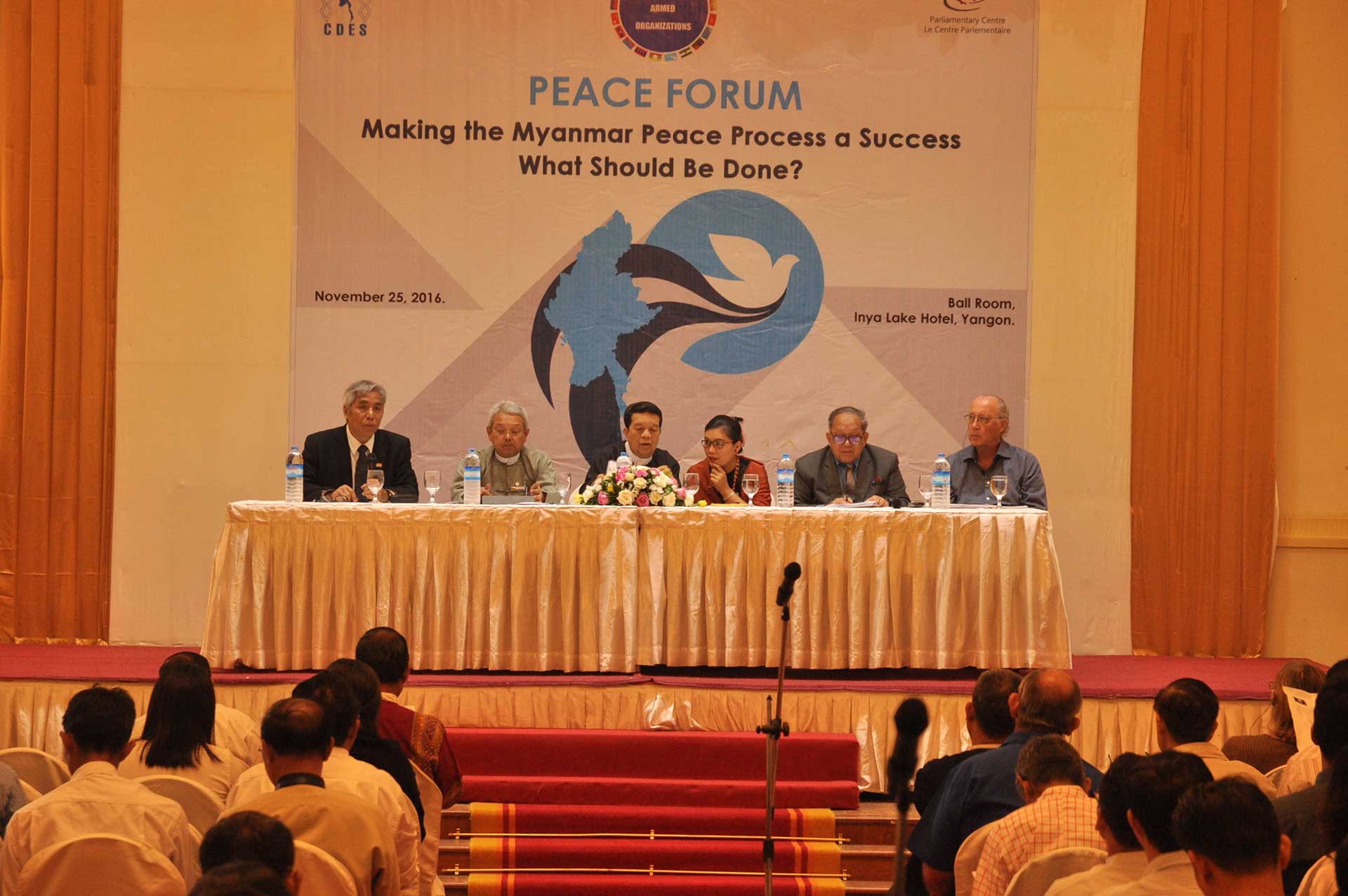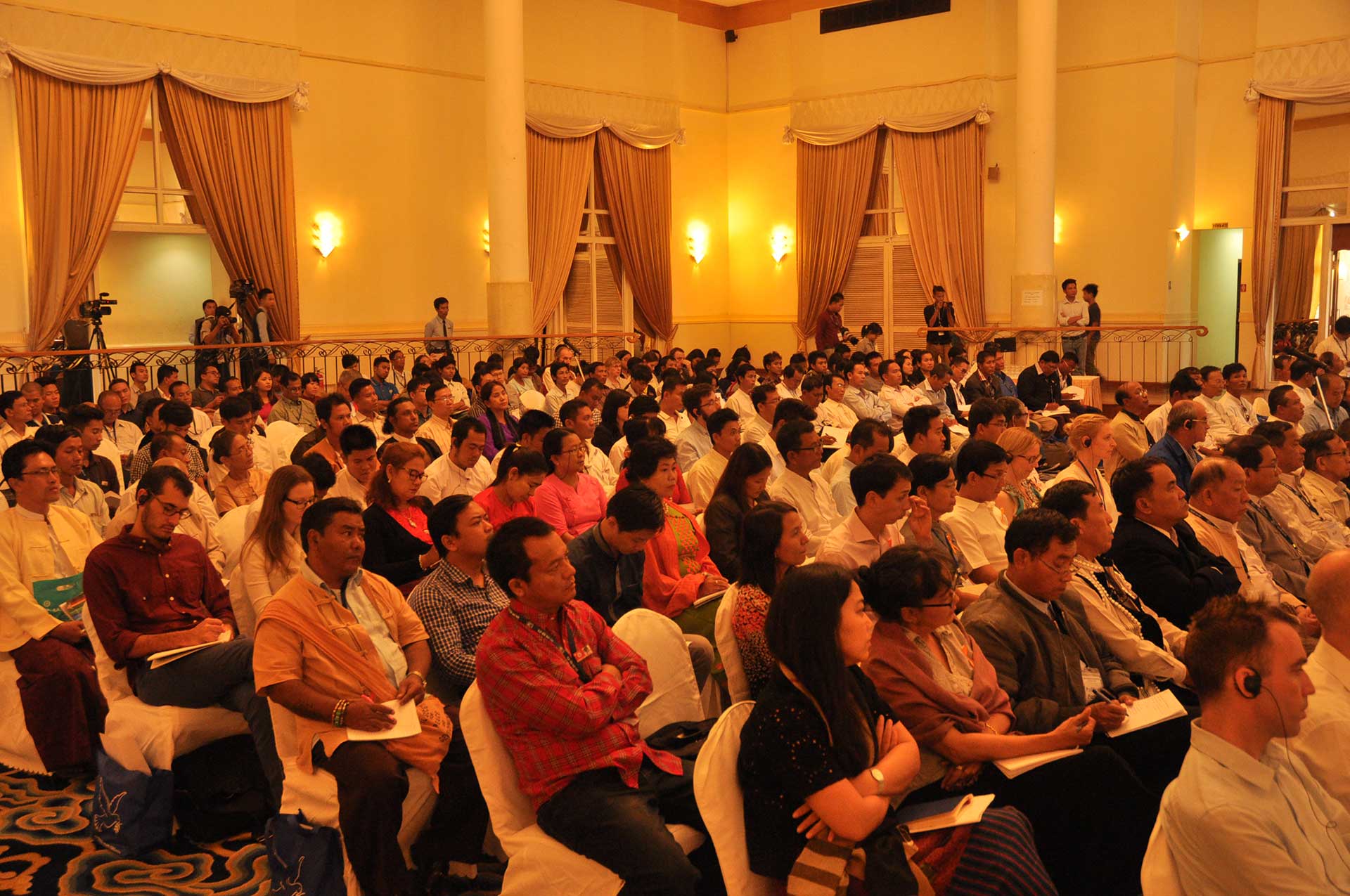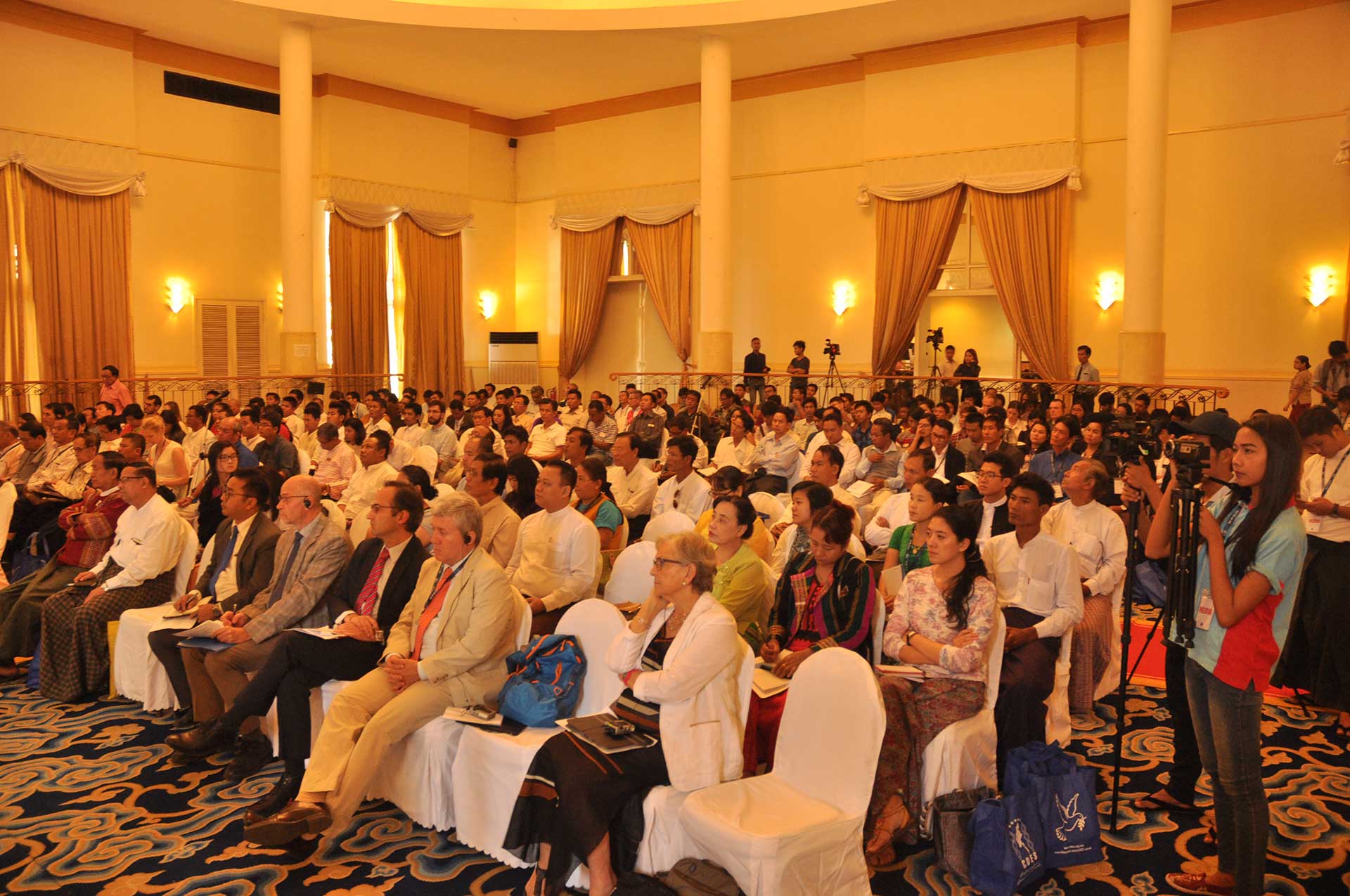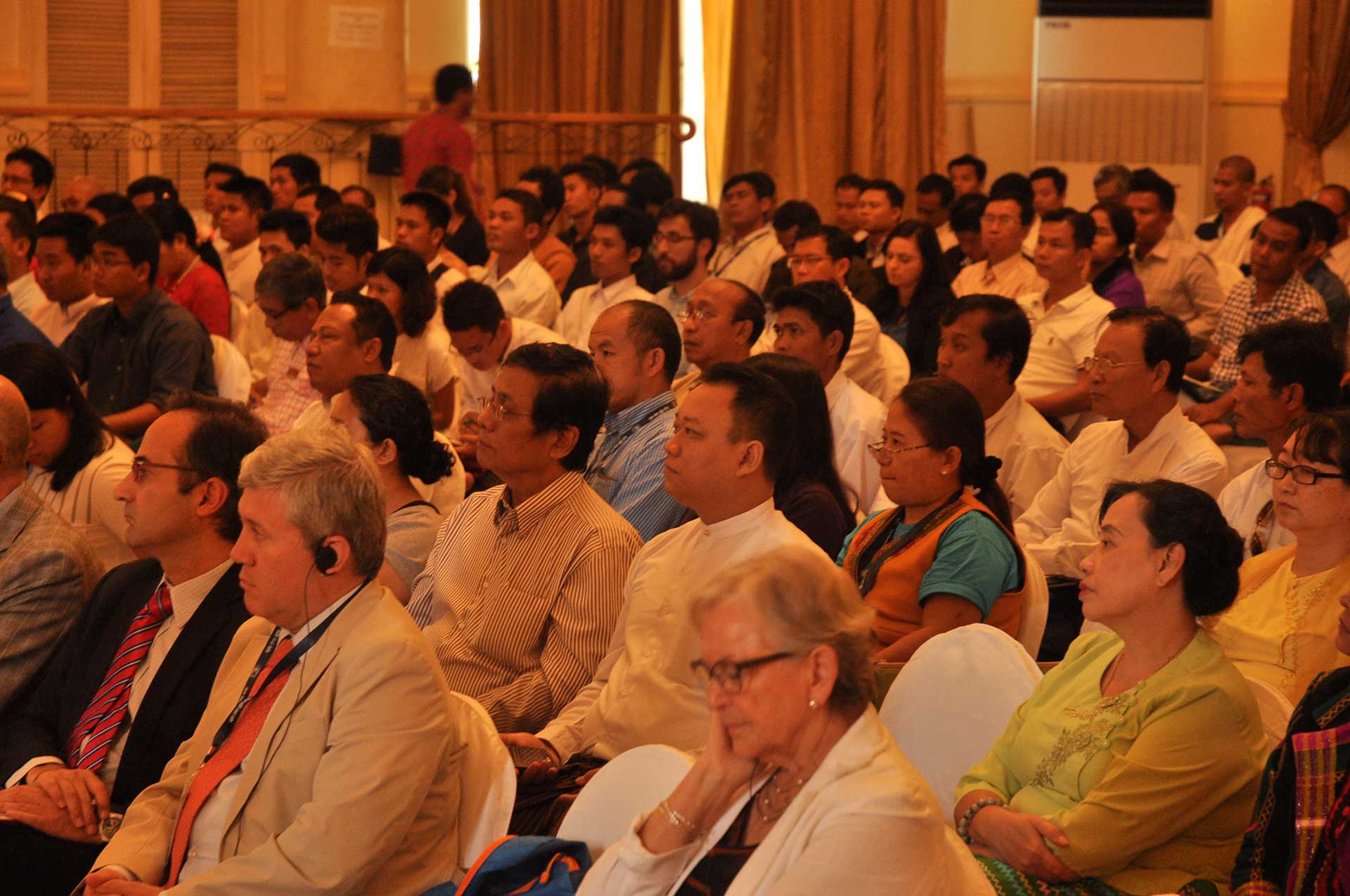Peace Forum




-
Topics:
International, National Peace figures Honor CDES Peace Forum.
-
Location:
Best Western Green Hill Hotel.
-
Activity Start Date:
25-11-2016 01:00 PM
-
Activity End Date:
25-11-2016 06:00 PM
Description
Steering the cogwheel towards peace, the Center for Development and Ethnic Studies (CDES) in cooperation with the Ethnic Armed Organizations and the Parliamentary Center, Canada, pooled peace wizards at the public peace forum with the mantra “Making Myanmar Peace Process a Success: What should be done”, attended by 217 representatives of various sectors in the society at the Mingalar Ball Room, Inya Lake Hotel, Yangon held 25 November 2016.
International and national authorities spoke in various spectra of the current peace process in Myanmar to the crowd representing different sectors of the society.
Dr. Lian H. Sakhong, CDES Executive Director introduced the dignitaries and resource persons as well as briefed the audience on updates regarding the Nationwide Ceasefire Agreement (NCA). “A droplet of rain when collected can make a pond, and a collection of water from the river, stream and lake can make an ocean. So, we pool all efforts not only the government, military and EAOs but also the political parties and civil society, and together we can achieve peace,” he mused with reassurance and encouragement in his welcome speech.
Dr. Tin Myo Win, Chairman of Government Peace Council, Vice-chairman of National Reconciliation and Peace Council (NRPC), and Government Chief negotiator espoused on the need for more trust, empathy and generosity among all citizens of Myanmar to truly achieve peace, stability and development. He said, the government is working hard through its policies on national reconciliation and amendment of the constitution to be able to deliver better education, health services and security and bring hope to the 52 millions of Myanmar population. He emphasized on the civil society’s important role and stirred everyone to work together and ease the pain of our people suffering from the fights and bring them hope through the Buddhism principle of Karma. “The more we feel with our people, the closer we are to peace,” he concluded.
Lt. General Khin Zaw Oo, General Secretary of Government Peace Commission and Union Peace Dialogue Joint Committee, and former representative of Myanmar in the National Ceasefire Negotiation expounded on “The position and perspectives of Myanmar military peace process. What makes it difficult for the Tatmadaw to find a common ground with EAOs?” Lieutenant underscored three points. First, it is impossible to leave out the NCA when talking of the peace process. He clearly stressed on meeting and negotiating with the demands of the non-signatory EAOs, so they will sign and move forward on the journey of peace. He succinctly articulated that the government, military and EAOs-S are working hard thus the need to encourage the non-signatories to ride the train of peace, but they need to buy the ticket to enjoy riding the train which is the NCA. Second, is the need to conduct a review on the conduct of peace process learning from the Colombian experience to be able to identify what went wrong and what went right and what must be done to address specifically the needs for an effective and efficient process. Third, all stakeholders need to cooperate in the shared role and rule for federalism. “The government, military have no more gap and so we continue to move forward along our journey,” he said. “And we need to be more patient, tolerant as we continue negotiating, and should you need also our assistance, we are willing to be of help as you join us on the train of peace,” he ended.
Ms. May Sabe Phyu, Director of Gender Equality Network talked on “Myanmar peace as related to the gender perspective.” She highlighted, “It is not because of war that there is no peace but because of the inability to resolve the discrimination and inequalities in the society. Thus, the need to review the peace process and include in the conditions and criteria of the NCA, Constitution and other documents to be really all-inclusive, not only among ethnicities but basically among men and women. The participation in the Union Peace Conference increased from 7.5 percent to 12.5 percent in the last Union conference, but still, this does not meet the minimum participation. Hence when curing the diseases of a sick country, we should cure all not leaving one behind; likewise, gender equality. Because, all long for peace, we all should work for peace by not only the will and willingness of women but to correct or straighten the approach so as to achieve an all-inclusive peace process.”
Mr. Khun Okker, Adviser to NCA-S EAOs political sector group and patron of Pa-O National Liberation Organization (PNLO) in his discourse on the “The prospect of political dialogue and its chance to succeed” reiterated all-inclusiveness which the government, military and NCA-S EAOs are working on to make peace possible. Dr. Arthur DeFehr, President of the DeFehr Foundation, Canada, and Officer of the Order of Canada in 2004, underscored in his message “It is very easy to start the war, much more difficult to end the war.” He added four major comments: First, There is no military solution to peace in Myanmar. Second, Partial peace is not peace, so peace must be all-inclusive. That means include all both genders and all civil society. Third, there is no magic formula for peace or federalism. It will be a unique federal Union because Myanmar is unique. Ethnic groups are diverse, citizenship must be a primary concern so that every human being must have an exercise of equality. Fourth, Peace is not free, it requires compromise. Keep focus also on the details of the negotiations. Mr. Juan Fernando Londoño Osorio, Advisor to the Peace Process in Colombia, Founder, Center for Analysis and Public Affairs, Colombia, Former Deputy Minister of Interior, Government of Colombia, emphasized on identifying the root causes of conflicts, negotiation agenda, the cost of peace and the key issues to consider. He concluded by saying, “It is better to have imperfect peace than perfect war”.
Mr. Gregory Marchildon, Professor, University of Toronto, former Deputy Premier of the province of Saskatchewan, pointed out, “Federalism is a continuous journey of balancing community and it starts with the constitution that frames basic principles. And continues with a balance of local loyalties and identities with the Union: balance of opportunities between states and central; fair division of tax; pragmatic sharing of tax capacity – Equalization ensures the Union has the capacity to provide the needs of the states. The formula are redone every five years.”
Dr. Fernand de Varennes, Dean of the Faculty of Law at the University of Moncton, Canada and Extraordinary Professor at the University of Pretoria, South Africa, stressed that “The government must reflect the linguistic and ethnic reality of the people for peace, stability and unity, so that every citizen’s rights are protected and respected each day. Canada have two official languages, developed. Provinces, territories have two or three official languages, and even more.”
David Haeri, Executive Director, Joint Peace Fund (JPF), explained the role of Joint Peace Fund (JPF) to Myanmar Peace Process. He acknowledged Dr. Lian H. Sakhong’s efforts of pooling resources to support peace process in Myanmar. He informed the public that JPF is being funded by nine countries supporting the peace process. He reiterated that there must be all-inclusiveness in Myanmar and must be a nationally owned peace process so that the people are engaged are the priorities. He further stressed on the importance of having direct negotiations and to ensure wider environment and participation for through holding annual conferences, national dialogue, and build confidence among women, youth, political parties. “Empowerment projects must at least be of priority, looking comprehensively on the sources of technical support to peace and in other development sectors,” he ended.
An Open Forum, which paved the audience to shoot their questions to the panellists, also took place which cropped up the principle of proportionality as basic in federal government and the importance of concessions and agreement as well as written rules or conditions and knowing the truth for transitional justice.
Mr. Zaceu Lian in his closing remarks reiterated the commitment of everyone in building a unique federal government in Myanmar, abiding with the principles of no disintegration of the union, no disunity, and no threat to other countries.